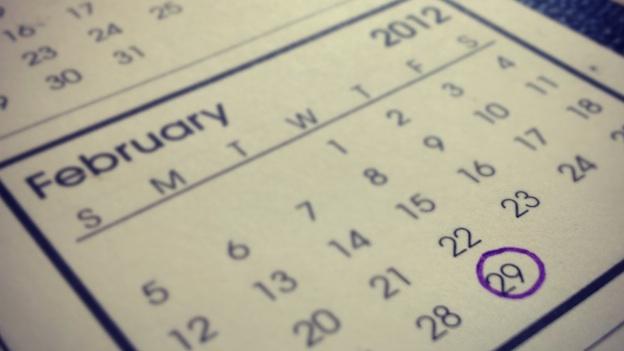 What would you do with an extra 24 hours? Think about all you could accomplish, everything you could catch up on and the progress you could make on the solo you’ve been working on. Well congratulations – here you go! Seeing as how today is Leap Day, you technically are given that extra 24 hours.
What would you do with an extra 24 hours? Think about all you could accomplish, everything you could catch up on and the progress you could make on the solo you’ve been working on. Well congratulations – here you go! Seeing as how today is Leap Day, you technically are given that extra 24 hours.
Like any other goal, improving in music requires a keen ability to look back. Most people do this at the end of the year (think New Year’s Resolutions), but why not take advantage of Leap Day as well? Even if, in reality, you can’t spend the whole day goofing off or learning something new – you still have to go to school or work today, after all – we suggest at least taking a few moments to reflect on your goals. We’re two months into the year now – how have you done with your own resolutions so far?
As you work toward your goals, one important thing to take note of is how effective your practice habits are. Are you making the best use of your time? Are you slowing down and using a metronome to help with more difficult passages? Or, conversely, is a fear of making mistakes stopping you from progressing?
To help you determine – and correct – your practicing habits, here’s a great music practice evaluation tool from the Musician’s Way Blog that we love (as you go through the list, note whether the statement is “True” or “False”):
Assessing Your Practice Habits
by Gerald Klickstein
1. My practice is deeply meaningful to me; I seldom feel bored.
2. I keep to a regular practice schedule.
3. My practice space is fully equipped with the tools I need.
4. I set detailed goals before beginning to practice.
5. I typically feel a sense of accomplishment after practicing.
6. I’m able to maintain mental focus as I practice.
7. I commonly record portions of my practice, and then I appraise my recordings.
8. I assess my practice objectively and rarely become upset by difficulties.
9. I use a metronome in practice.
10. I consistently warm up before practicing.
11. I intersperse practice sessions with regular breaks.
12. I can learn accessible music securely and efficiently.
13. I have plenty of accessible pieces in my repertoire.
14. At the outset of learning a piece, I develop a basic interpretation before making technical decisions.
15. I’m able to shape dramatic musical interpretations that move listeners.
16. When learning a new piece, I expressively vocalize rhythm.
17. I use specific strategies to solve musical and technical problems.
18. I manage repetition so that I neither repeat errors nor drill passages to the point of fatigue.
19. I use mental imaging to aid my learning and memorization of music.
20. I consciously look ahead as I play or sing.
21. I’m satisfied with the tactics that I use to increase the tempos of pieces.
22. I’m confident in my ability to memorize music and to perform from memory.
23. I have a broad-based plan to polish my technique, and I practice technique daily.
24. I routinely practice sight reading.
25. I can improvise melodies over straightforward chord progressions.
26. I review my favorite pieces in detail so that the expressive and technical components stay vibrant.
27. I listen to a range of recorded music, and I regularly attend live music performances.
28. I’m advancing my knowledge of music theory, ear training, and other general music topics.
29. I take deliberate steps to fuel my motivation to practice and counter procrastination.
30. When I make errors in practice, I view them as instructive and not as indicative of failure.
31. I understand how to practice such that I can perform confidently and artistically.
32. As I practice, I embody habits of excellence: easy, expressiveness, accuracy, rhythmic vitality, beautiful tone, focused attention and positive attitude.
What other ways do you evaluate your habits when practicing music? Share your goals – and how you’ve progressed since setting them – below! Like these posts? Sign up to receive daily updates right to your inbox! Click here to subscribe.
You might also like…
– Your Guide to Setting SMART Musical Goals
– 5 Excuses for Not Practicing – And How to Overcome Them
– Practice Makes Perfect, But Are You Doing it Right?
Assessment © 2012 Gerald Klickstein | Excerpted from The Musician’s Way: A Guide to Practice, Performance, and Wellness.
Suzy S.
